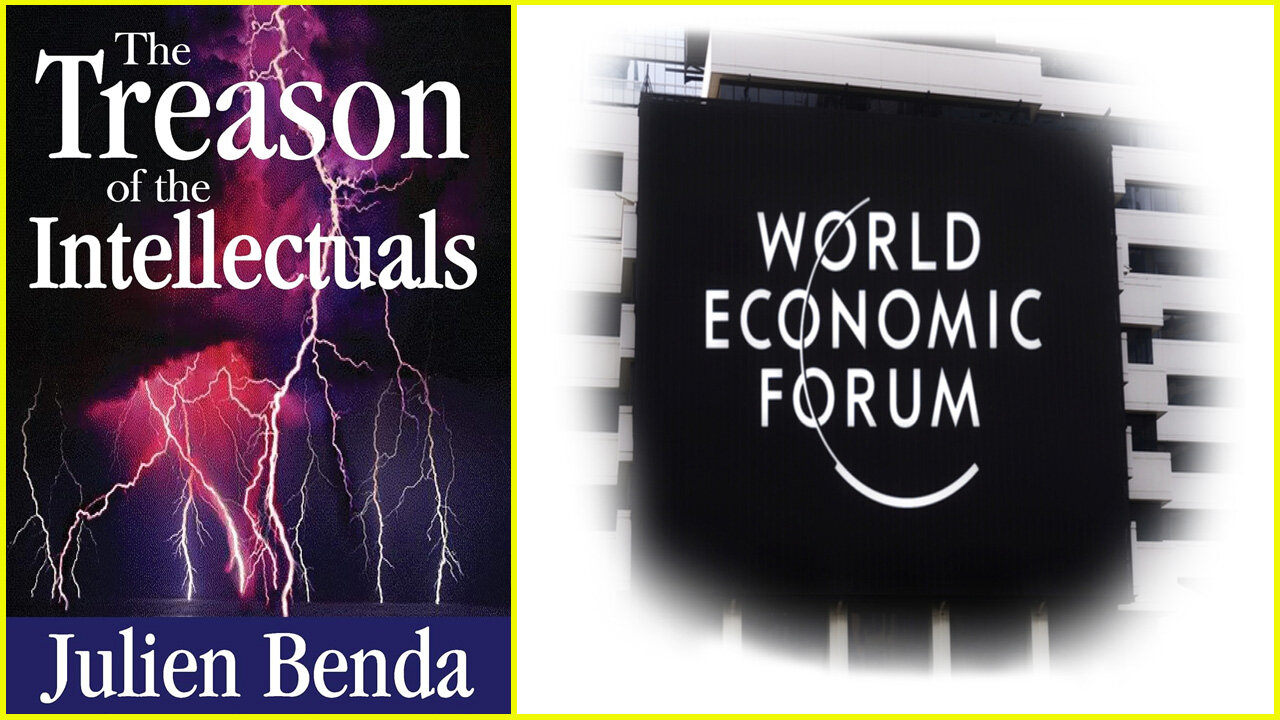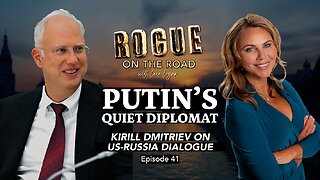Premium Only Content

'La Trahison des Clercs' (1927) by Julien Benda
Julien Benda’s 'La Trahison des Clercs', translated as 'The Treason of the Intellectuals', or, 'The Betrayal by the Intellectuals', delivers a scathing critique of the intellectual class of his time. He accused philosophers, writers, academics, and journalists—whom he termed clercs—of betraying their duty to uphold universal ideals of truth, justice, and reason. Instead, Benda argued, they had sold their intellectual integrity in service of nationalism, political ideologies, and the pursuit of power. Intellectuals, traditionally seen as guardians of moral clarity and rational discourse, had aligned themselves with political forces that favored passion and tribalism over reason and universalism.
Benda’s central concern was that intellectuals, by abandoning their disinterested stance, had enabled the rise of ideologies that justified violence, war, and nationalistic fervor. He believed that the intellectual betrayal played a critical role in the political and moral decay that contributed to the onset of World War I and the rise of fascism. This “treason” was not just a betrayal of abstract ideas, but a moral corruption that had devastating consequences for society.
Benda’s critique of intellectuals and their political entanglements resonates strongly today when we consider the concept of the “deep state” in modern democracies like the United States and the European Union. The “deep state” refers to the allegedly secretive and unaccountable network of bureaucrats, intelligence agencies, technocrats, and institutional elites who exercise significant power and influence, often without the consent or oversight of the public. Though the specifics of power dynamics have changed, the parallels between Benda’s concerns and the modern critique of the deep state are striking.
Intellectual Betrayal and the Deep State: Benda’s core argument in La Trahison des Clercs is that intellectuals, in forsaking their duty to serve universal truth and reason, have instead chosen to support ideologies and powers that promote particularistic interests. Intellectuals, once the champions of disinterested truth, have become pawns of political passions—serving ideologies such as nationalism and racism, which, according to Benda, lead to violence and war. He believed that their participation in these ideologies contributed directly to the moral decay of society.
In the modern context, critics of the so-called “deep state” argue that it too represents a betrayal of the public’s trust and the ideals of democracy. Rather than serving the public good or promoting the common welfare, these elites are accused of serving their own interests, maintaining their positions of power, and manipulating systems for their benefit. Intellectuals, politicians, and bureaucrats within the deep state are seen as more focused on preserving their own influence than on upholding universal ideals or promoting transparency and accountability.
Like the intellectuals of Benda’s day, the modern “deep state” is often accused of shaping narratives and controlling information in ways that support its own power. Just as Benda feared that intellectuals would lend their authority to nationalist or fascist movements, critics of today’s deep state suggest that contemporary elites use their power to sustain technocratic governance, globalist agendas, or economic structures that favor entrenched interests. These elites, rather than promoting reasoned, disinterested dialogue, are often seen as creating and maintaining ideologies that justify their own control and authority.
Universalism vs. Partisanship: A Comparison: Benda’s criticism of intellectuals centers on their abandonment of universalism in favor of partisan political ideologies. He believed that intellectuals should uphold universal values—truth, justice, and reason—rather than align themselves with particular political factions or nationalistic causes. In Benda’s view, intellectuals had forsaken their responsibility to be impartial, objective seekers of truth. Instead, they embraced ideologies that rationalized violence and division, a shift that he argued contributed to the moral decline of society.
Similarly, the modern deep state is often accused of privileging certain ideologies or political frameworks—whether globalism, identity politics, or economic interests—over more universal democratic ideals. Critics argue that these elites, much like Benda’s intellectuals, have abandoned impartiality in favor of ideologies that maintain their power. In both cases, the result is a corruption of public discourse, where narratives are shaped not by reason and universal principles, but by political passions and vested interests.
The Role of Intellectuals and Institutions in Shaping Public Opinion
Benda’s critique of intellectuals was rooted in the idea that they wielded significant influence over public opinion. Intellectuals, whether through books, articles, or speeches, helped shape the moral and political direction of society. However, Benda believed that rather than using their influence to promote objective truths or ethical reasoning, many intellectuals used their platforms to support dangerous ideologies that aligned with the powerful and the elite.
In today’s world, critics of the deep state argue that similar mechanisms are at work. Media outlets, universities, think tanks, and even government agencies are seen as shaping public opinion to favor certain political or economic interests. Just as Benda accused intellectuals of rationalizing war and nationalism, today’s critics claim that elites use their influence to justify policies that consolidate power and marginalize dissenting voices. The power of institutions, whether in the form of government bureaucracy or corporate media, is seen as increasingly directed toward preserving the status quo, rather than challenging it with new ideas or perspectives.
Institutional Power and Transparency: One significant difference between Benda’s critique and the modern understanding of the deep state is the nature of the institutions involved. Benda focused primarily on intellectuals, individuals who wielded power through their words and ideas. Today, however, the deep state is seen as a vast, shadowy network of institutional elites—intelligence agencies, bureaucrats, and corporate interests—that operate with a significant degree of opacity and lack of accountability.
While intellectuals in Benda’s time were visible figures, the modern deep state operates behind closed doors. The decision-making processes are often hidden from the public eye, making it difficult for ordinary citizens to hold those in power accountable. This lack of transparency is a key point of critique from those who argue that the deep state is undemocratic, with power concentrated in the hands of a few elites who are not subject to the same scrutiny or control as elected officials.
Conclusion: The Continuation of Benda’s Warning: Julien Benda’s La Trahison des Clercs remains a prescient warning about the dangers of intellectuals forsaking their duties in favor of partisan politics and ideologies. His critique of intellectual betrayal is just as relevant today as it was in the early 20th century. The modern “deep state,” with its network of bureaucrats, technocrats, and institutional elites, is often accused of similar betrayals—abandoning universal democratic principles in favor of maintaining power and serving particularistic interests.
In both cases, Benda’s solution is clear: intellectuals and elites must return to their commitment to universalism, reason, and truth, resisting the temptation to serve ideology or power. Whether in the 1920s or the 2020s, the betrayal of intellectuals and elites can have dangerous consequences for society, undermining trust in institutions and eroding the foundations of democracy. The challenge, then, is to ensure that those in positions of influence remain committed to disinterested truth and the public good, rather than succumbing to the corrupting forces of ideology and power.
-
 2:10:21
2:10:21
The Culture War with Tim Pool
2 hours agoLeftist TERROR Attack On Coast Guard, Liberals Claim Trump Is A TYRANT | The Culture War DEBATE
99.4K151 -
 23:38
23:38
Professor Nez
1 hour ago🚨NO WAY HE RECOVERS! Trump CONFRONTS Aussie Ambassador & Finishes Him Off
2.48K2 -
 4:07
4:07
Sean Unpaved
1 hour agoFBI Hoops Bust Day 2!, NFL/CFB Week 8-9, & World Series Opener Preview
3.19K -

Lara Logan
14 hours agoPUTIN’S QUIET DIPLOMAT: Kirill Dmitriev on Peace & War in Ukraine | EP 41 | Going Rogue w Lara Logan
5.76K2 -
 LIVE
LIVE
Side Scrollers Podcast
1 day ago🔴SIDE SCROLLERS SUB-A-THON🔴FINAL DAY!🔴Craig Makeover + US Dart Throw + More!
1,259 watching -
 12:29
12:29
Clintonjaws
17 hours ago $24.15 earnedShane Gillis vs 'The View' - This Is Priceless!
55.2K21 -
 1:29:35
1:29:35
Steven Crowder
4 hours agoWhich Way Western Man: Zohran Mamdani & The Great Rice Debate
221K172 -
 32:55
32:55
The Rubin Report
3 hours agoCrowd Roars for Cuomo’s Blistering Attack on Zohran Mamdani
31.6K53 -
 LIVE
LIVE
The Mel K Show
3 hours agoMORNINGS WITH MEL K - Slow Rolling Disclosure Becoming Unstoppable Truth Tsunami - 10-24-25
653 watching -
 LIVE
LIVE
Major League Fishing
8 days agoLIVE! - Fishing Clash Team Series: Patriot Cup - Day 3
367 watching